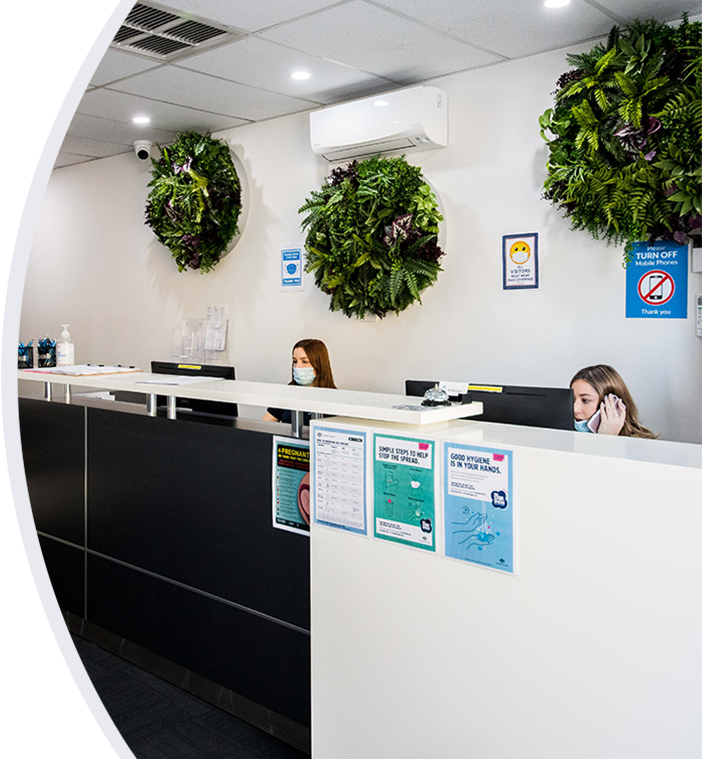MRI
MRI stands for magnetic resonance imaging. It uses a strong magnetic field and radio-waves to generate an image of the body.
Why am I getting an MRI?
An MRI provides a detailed scan of any part of your body. It is used to closely evaluate or help diagnose a problem or symptom. Sometimes it is done to provide more detail that other types of scans are unable to provide.
Are MRI scans safe?
MRI scans are very safe. They use very strong magnetic fields and sound waves to create an image of your body. The sound waves are similar to the FM radio bandwidth used today. You will notice the MRI scan room will not have many windows and have a heavy door. This is to get radio waves and phone signals out of the scan room.
MRI’s have been performed on pregnant patients for some time. These studies are on very ill mothers where the MRI scan is deemed necessary by specialists. We avoid scanning pregnant patients in the first trimester and only perform MRI examinations on patients deemed urgent by the referring physician and our reporting Radiologist.
What do I need to do to prepare for my MRI?
1. Previous scans
If you have any previous scans (including MRI, CT, Xray, Ultrasound or others), please bring these in with you. Old scans can provide useful information that helps the radiologist when writing your MRI report.
2. Safety questionnaire
MRI uses a strong magnet and can attract metal easily, including metal on top or inside you. You will be asked to complete a safety questionnaire prior to your scan to assess your suitability for an MRI. If you plan to have a support person inside the MRI room with you, they will also be required to complete a safety questionnaire. The questionnaire will screen for the presence of the following:
- pacemakers
- aneurysm clips or coils within vessels
- metal valve replacement
- any implants: cochlear, dental or other
- metal foreign bodies in the eye or elsewhere (shrapnel etc)
- neurostimulators
- Diabetic (CGM) devices and insulin pumps cannot enter the scan room. Talk to your MRI tech prior to the appointment to ensure you maximise your expensive CGM patch use.
If any of these apply, please bring documentation with details of the implants with you so you can be assessed for safety to enter the MRI.
Safety measures
it is important to take the following measures to avoid risk of harm:
- Try to leave valuables at home or, alternatively, leave all objects in a basket provided with the MRI tech. This includes any accessories such as watches and jewellery, safety pins, hairpieces, belts, mobile phones and credit cards.
- Do not wear any make-up or hair spray as these may contain traces of metal and cause the area to heat up in the MRI, causing your skin or hair to heat up.
Inform staff if you:
- have any tattoos
- have skin drug patches
- are pregnant
- claustrophobic
If you are claustrophobic, you may not tolerate the scan. Discuss this with your doctor and they may prescribe you a sedative, which you will be advised to take prior to the scan. If necessary, we may be able to provide sedation in the clinic. If a sedative is required, you will need to wait until you are fully awake before going home and you will be advised to have a support person to drive you to and from your MRI appointment.
Special instructions
- Fasting: Most often you are required to fast for abdominal and pelvic scans. Instructions will be provided to you prior to your scan
- Medications: you should be able to continue your regular medications. If unsure, please check with us at the time of booking.
On the back of the safety form is a short questionnaire about your injury or source of discomfort. These questions assist the reporting specialist with additional medical background of procedures you have had in the past such as surgery, injections and injuries
Your MRI procedure
After completing the safety form, your MRI tech (radiographer) will go through the safety form and information provided on the back of the form. This will ensure your safety concerns are met and the study can be tailored to your needs.
A hospital gown is usually provided for your safety and to reduce the chance of dangerous goods entering the room. Electronics entering the room will be irreversibly damaged by the magnetic field and sound waves.
Once in the room the MRI tech will place you on the scanner bed while explaining the procedure. The scan can take up to 15 minutes and is divided into four to six sequences. The MRI tech will check on you throughout the scan. Headphones or ear plugs are used to protect your hearing during the procedure which can reach up to 100 decibels. An emergency button will be provided to you if you wish to stop or communicate with the MRI tech at any time. If the scan is stopped during a sequence, the sequence must be re-started. It is therefore advised to wait until a sequence is complete to talk to the MRI tech where possible.
A coil is often placed over the body part to be examined, this is used to focus the image in greater detail for your doctor. Coils come in all shapes and sizes and may appear like a restraint. Inform the MRI tech if you are uncomfortable at any point. MRI studies can be daunting and our experienced staff may be able to perform the study in a slightly different way.
The part of the body being examined needs to be in the centre of the magnet (scanner) where the magnetic field is most uniform for optimal imaging. We try to place the patient’s feet first in the scanner to reduce claustrophobia and make the examination as comfortable and easy as possible. Scans that are done head first include head/neck, shoulder and other upper body parts.
The first scan is a 20 second localiser which is used to plan the study, so if you move out of position after this we may have to restart the examination. So make sure you are comfortable when in position. We have all the state of the art equipment at Vision Radiology so please ask if there is anything we can do to make you more comfortable. As the scan proceeds you may feel some warmth, this is a normal part of the procedure and is monitored closely on our modern scanners. It’s important to relax, keep as still as possible and avoid clenching or stiffening up as any movement may reduce the scan quality.
Remember we are here to help!
MRI with contrast
If you are having a scan with contrast, a cannula will be inserted in your arm through which the contrast is injected.
Some studies require an injection of MRI contrast called Gadolinium. Gadolinium is not radio-active although it sounds like it is. It is a rare earth metal that combines well with blood for about 20 minutes and is normally excreted via the bladder. MRI contrast is used to visualise vascular structures in greater detail. It is usually injected towards the end of the study. If you are currently breastfeeding, please talk to your MRI tech or receptionist at the time of making your appointment. MRI contrast will be excreted into your breast milk in very small quantities and, although most guidelines deem this safe, we advise mothers to discard your breast milk for 24 hours after the contrast.
After your examination, you will be slowly moved from the scanner, coil removed from the scan site and cannula removed.
You will be able to collect your belongings and enjoy the rest of your day. If you received a contrast injection, remember to drink plenty of water after the scan.
Results?
After your examination you can request your results to go to your GP, specialist or Allied Health professional.
You may receive a text message and link to your images online. The report will be with your referring physician within 48 hours. Please see your doctor to discuss the results.

We offer accessible services by bulk billing almost all examinations and procedures. To find out more, visit our billing information page.
Complete our booking form and one of our friendly staff will contact you – it’s quick, and easy. Click on the below link and follow the simple steps. Remember to have your referral handy.


















